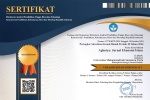Peran Teknologi Blockchain Untuk Institusi Zakat di Indonesia
Abstract
Indonesia is one of the most populous Muslim countries in the world but is still plagued with poverty. Zakat is one of the effective tools of Islamic philanthropy to reduce poverty, therefore zakat management is very important for this country so that zakat collection and distribution can be maximized. In today's digital world, it is very important for zakat institutions to use technology so that zakat management performance can be better and more efficient. The technology that stole the world's attention is blockchain technology. Blockchain technology has disrupted the financial sector because it offers transparent transactions so there is no need for intermediaries. This study explains the role of blockchain technology on zakat institutions in Indonesia. The research method used is an extensive literature to identify and analyze the relevant literature. The results of the study show that the role of blockchain technology can improve zakat management, especially on transparency in zakat distribution so that muzakki's trust in zakat institutions is improving.
Full Text:
PDFReferences
Abubakar, Y. S., Ogunbado, A. F., & Saidi, M. A. (2018). Bitcoin and its Legality from Shariah Point of View. SEISENSE Journal of Management, 1(4), 13–21. https://doi.org/10.33215/sjom.v1i4.32
Ahmed, T. A. I., & Zakaria, M. S. (2021). View of Using Blockchain for Managing Zakat Distribution: A Juristic Anlytical Study. Al-Hikmah International Journal for Is-Lamic Studies & Human Sciences, 1(2). https://doi.org/https://doi.org/10.46722/hkmh.4.2.21b
Andayani, D. R., Hanum, K., Zaenal, M. H., Asmita, B., Damayanti, D. R., Fahrudin, & Kardiman, M. (2019). Statistik Zakat Nasional 2018. Retrieved from https://baznas.go.id/szn2018
Avdoshin, S., & Pesotskaya, E. (2021). Blockchain in Charity: Platform for Tracking Donations. https://doi.org/10.1007/978-3-030-63089-8_45
Beik, I. S., Zaenal, M. H., & Saoqi, A. A. Y. (2021). The Optimization of Blockchain for Greater Transparency in Zakat Management. Islamic FinTech, 281–297. https://doi.org/10.1007/978-3-030-45827-0_16
Canggih, C., Fikriyah, K., & Yasin, A. (2017). Potensi Dan Realisasi Dana Zakat Indonesia. Al-Uqud : Journal of Islamic Economics, 1(1), 14. https://doi.org/10.26740/jie.v1n1.p14-26
Farooq, M. S., Khan, M., & Abid, A. (2020). A framework to make charity collection transparent and auditable using blockchain technology. Computers and Electrical Engineering, 83, 106588. https://doi.org/10.1016/j.compeleceng.2020.106588
Firdaus, M., Beik, I. S., Irawan, T., & Juanda, B. (2012). Economic estimation and determinations of Zakat potential in Indonesia. In IRTI Working Paper Series. Retrieved from http://www.isdb.org/irj/go/km/docs/documents/IDBDevelopments/Internet/English/IRTI/CM/downloads/Working Paper Series/WP-1433-07.pdf
Morkunas, V. J., Paschen, J., & Boon, E. (2019). How blockchain technologies impact your business model. Business Horizons, 62(3), 295–306. https://doi.org/10.1016/j.bushor.2019.01.009
Qardawi, Y. Al. (1999). Fiqh Al Zakah: A Comparative Study of Zakah, Regulations and Philosophy in the Light of Qur’an and Sunnah (Volume I). In King Abdulaziz University.
Tapscott, D., & Tapscott, A. (n.d.). Blockchain revolution : how the technology behind bitcoin and other cryptocurrencies is changing the world. 358.
Zulfikri, Z., Kassim, S. H., & Hawariyuni, W. (2021). Proposing Blockchain Technology Based Zakat Management Model to Enhance Muzakki’s Trust in Zakat Agencies: A Conceptual Study. Journal of Accounting Research, Organization and Economics, 4(2), 153–163. Retrieved from http://202.4.186.66/JAROE/article/view/20467
Bara, A., & Riyan Pradesyah. (2019). Analysis Of The Management Of Productive Zakat At The Muhammadiyah, City Of Medan. INSIS: Internasional Seminar Of Islamic Studies (pp. 617-622). Medan: INSIS: Internasional Seminar Of Islamic Studies.
Bara, A., Riyan Pradesyah, & Nurman Ginting. (2019). Strategi Pengelolaan Zakat Produktif Dalam Pengentasan Kemiskinan (Studi Kasus Lembaga Zakat Muhammadiyah Kota Medan). Misykat al-Anwar: Jurnal Kajian Islam dan Masyarakat, 186-195.
DOI: https://doi.org/10.30596/aghniya.v3i2.8912
Refbacks
- There are currently no refbacks.
Aghniya: Jurnal Ekonomi Islam is licensed under a Creative Commons Attribution-ShareAlike 4.0 International License.
Aghniya: Jurnal Ekonomi Islam
Faculty of Islamic Religion,Universitas Muhammadiyah Sumatera Utara. Address: Kampus Utama Jl. Kapten Muchtar Basri No.3, Glugur Darat II,Medan Sumatera Utara-20238.
E-mail: aghniya@umsu.ac.id





